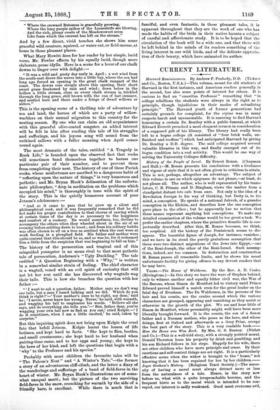History of the People of Israel. By Ernest Renan. (Chapman
and Han.)-31. Renan presents his conclusions with a liveliness and vigour of style that it is not often given to criticism to attain. This is not, perhaps, altogether an advantage. The subject of this volume is one on which epigrams do not please,---at least, do not please all. The author, who is well represented by his trans- lators, C. B. Pitman and D. Bingham, views the matter from a standpoint distant foto ccelo from ours. Not only is the idea of a Revelation foreign to his way of thinking, but Deity is, to his mind, a conception. He speaks of a national Jahveh, of a grander conception in the Elohim, and describes how the one conception gave place to the other ; but he apparently has no notion that these names represent anything but conceptions. To make any detailed examination of the volume would be too great a task. We prefer the earlier chapters, where the primitive Semitic life is con- jecturally described. After this, M. Henan becomes, we think, too sceptical. All the history of the Pentateuch seems to dis- appear. The beautiful figure of Joseph, for instance, vanishes ; and we have in its stead the purely gratuitous assumption that there were two distinct migrations of the Jews into Egypt,—one of the Beth-Joseph, the other of the Beni-Israel. Such assump- tions, indeed, are too common. In destruction and construction M. Henan passes all reasonable limits, and he shows his usual unfortunate facility for giving offence to any devout readers that he may have.


































 Previous page
Previous page